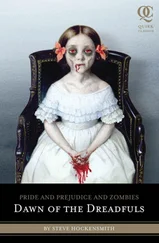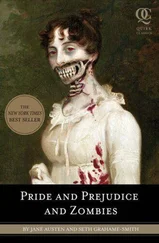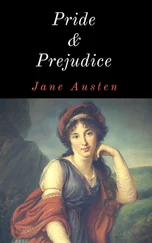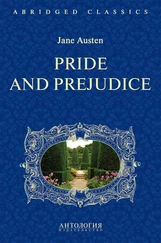Jane Austin - Pride and Prejudice
Здесь есть возможность читать онлайн «Jane Austin - Pride and Prejudice» — ознакомительный отрывок электронной книги совершенно бесплатно, а после прочтения отрывка купить полную версию. В некоторых случаях можно слушать аудио, скачать через торрент в формате fb2 и присутствует краткое содержание. Жанр: unrecognised, на немецком языке. Описание произведения, (предисловие) а так же отзывы посетителей доступны на портале библиотеки ЛибКат.
- Название:Pride and Prejudice
- Автор:
- Жанр:
- Год:неизвестен
- ISBN:нет данных
- Рейтинг книги:3 / 5. Голосов: 1
-
Избранное:Добавить в избранное
- Отзывы:
-
Ваша оценка:
- 60
- 1
- 2
- 3
- 4
- 5
Pride and Prejudice: краткое содержание, описание и аннотация
Предлагаем к чтению аннотацию, описание, краткое содержание или предисловие (зависит от того, что написал сам автор книги «Pride and Prejudice»). Если вы не нашли необходимую информацию о книге — напишите в комментариях, мы постараемся отыскать её.
Pride and Prejudice — читать онлайн ознакомительный отрывок
Ниже представлен текст книги, разбитый по страницам. Система сохранения места последней прочитанной страницы, позволяет с удобством читать онлайн бесплатно книгу «Pride and Prejudice», без необходимости каждый раз заново искать на чём Вы остановились. Поставьте закладку, и сможете в любой момент перейти на страницу, на которой закончили чтение.
Интервал:
Закладка:
and relieve the poor. Family pride, and _filial_ pride—for he is
very proud of what his father was—have done this. Not to appear
to disgrace his family, to degenerate from the popular qualities,
or lose the influence of the Pemberley House, is a powerful
motive. He has also _brotherly_ pride, which, with _some_
brotherly affection, makes him a very kind and careful guardian
of his sister, and you will hear him generally cried up as the
most attentive and best of brothers.”
“What sort of girl is Miss Darcy?”
He shook his head. “I wish I could call her amiable. It gives me
pain to speak ill of a Darcy. But she is too much like her
brother—very, very proud. As a child, she was affectionate and
pleasing, and extremely fond of me; and I have devoted hours and
hours to her amusement. But she is nothing to me now. She is a
handsome girl, about fifteen or sixteen, and, I understand,
highly accomplished. Since her father’s death, her home has been
London, where a lady lives with her, and superintends her
education.”
After many pauses and many trials of other subjects, Elizabeth
could not help reverting once more to the first, and saying:
“I am astonished at his intimacy with Mr. Bingley! How can Mr.
Bingley, who seems good humour itself, and is, I really believe,
truly amiable, be in friendship with such a man? How can they
suit each other? Do you know Mr. Bingley?”
“Not at all.”
“He is a sweet-tempered, amiable, charming man. He cannot know
what Mr. Darcy is.”
“Probably not; but Mr. Darcy can please where he chooses. He does
not want abilities. He can be a conversible companion if he
thinks it worth his while. Among those who are at all his equals
in consequence, he is a very different man from what he is to the
less prosperous. His pride never deserts him; but with the rich
he is liberal-minded, just, sincere, rational, honourable, and
perhaps agreeable—allowing something for fortune and figure.”
The whist party soon afterwards breaking up, the players gathered
round the other table and Mr. Collins took his station between
his cousin Elizabeth and Mrs. Phillips. The usual enquiries as to
his success were made by the latter. It had not been very great;
he had lost every point; but when Mrs. Phillips began to express
her concern thereupon, he assured her with much earnest gravity
that it was not of the least importance, that he considered the
money as a mere trifle, and begged that she would not make
herself uneasy.
“I know very well, madam,” said he, “that when persons sit down
to a card-table, they must take their chances of these things,
and happily I am not in such circumstances as to make five
shillings any object. There are undoubtedly many who could not
say the same, but thanks to Lady Catherine de Bourgh, I am
removed far beyond the necessity of regarding little matters.”
Mr. Wickham’s attention was caught; and after observing Mr.
Collins for a few moments, he asked Elizabeth in a low voice
whether her relation was very intimately acquainted with the
family of de Bourgh.
“Lady Catherine de Bourgh,” she replied, “has very lately given
him a living. I hardly know how Mr. Collins was first introduced
to her notice, but he certainly has not known her long.”
“You know of course that Lady Catherine de Bourgh and Lady Anne
Darcy were sisters; consequently that she is aunt to the present
Mr. Darcy.”
“No, indeed, I did not. I knew nothing at all of Lady Catherine’s
connections. I never heard of her existence till the day before
yesterday.”
“Her daughter, Miss de Bourgh, will have a very large fortune,
and it is believed that she and her cousin will unite the two
estates.”
This information made Elizabeth smile, as she thought of poor
Miss Bingley. Vain indeed must be all her attentions, vain and
useless her affection for his sister and her praise of himself,
if he were already self-destined for another.
“Mr. Collins,” said she, “speaks highly both of Lady Catherine
and her daughter; but from some particulars that he has related
of her ladyship, I suspect his gratitude misleads him, and that
in spite of her being his patroness, she is an arrogant,
conceited woman.”
“I believe her to be both in a great degree,” replied Wickham; “I
have not seen her for many years, but I very well remember that I
never liked her, and that her manners were dictatorial and
insolent. She has the reputation of being remarkably sensible and
clever; but I rather believe she derives part of her abilities
from her rank and fortune, part from her authoritative manner,
and the rest from the pride of her nephew, who chooses that
everyone connected with him should have an understanding of the
first class.”
Elizabeth allowed that he had given a very rational account of
it, and they continued talking together, with mutual satisfaction
till supper put an end to cards, and gave the rest of the ladies
their share of Mr. Wickham’s attentions. There could be no
conversation in the noise of Mrs. Phillips’s supper party, but
his manners recommended him to everybody. Whatever he said, was
said well; and whatever he did, done gracefully. Elizabeth went
away with her head full of him. She could think of nothing but of
Mr. Wickham, and of what he had told her, all the way home; but
there was not time for her even to mention his name as they went,
for neither Lydia nor Mr. Collins were once silent. Lydia talked
incessantly of lottery tickets, of the fish she had lost and the
fish she had won; and Mr. Collins in describing the civility of
Mr. and Mrs. Phillips, protesting that he did not in the least
regard his losses at whist, enumerating all the dishes at supper,
and repeatedly fearing that he crowded his cousins, had more to
say than he could well manage before the carriage stopped at
Longbourn House.
Chapter 17
Elizabeth related to Jane the next day what had passed between
Mr. Wickham and herself. Jane listened with astonishment and
concern; she knew not how to believe that Mr. Darcy could be so
unworthy of Mr. Bingley’s regard; and yet, it was not in her
nature to question the veracity of a young man of such amiable
appearance as Wickham. The possibility of his having endured such
unkindness, was enough to interest all her tender feelings; and
nothing remained therefore to be done, but to think well of them
both, to defend the conduct of each, and throw into the account
of accident or mistake whatever could not be otherwise explained.
“They have both,” said she, “been deceived, I dare say, in some
way or other, of which we can form no idea. Interested people
have perhaps misrepresented each to the other. It is, in short,
impossible for us to conjecture the causes or circumstances which
may have alienated them, without actual blame on either side.”
“Very true, indeed; and now, my dear Jane, what have you got to
say on behalf of the interested people who have probably been
concerned in the business? Do clear _them_ too, or we shall be
obliged to think ill of somebody.”
“Laugh as much as you choose, but you will not laugh me out of my
opinion. My dearest Lizzy, do but consider in what a disgraceful
light it places Mr. Darcy, to be treating his father’s favourite
Читать дальшеИнтервал:
Закладка:
Похожие книги на «Pride and Prejudice»
Представляем Вашему вниманию похожие книги на «Pride and Prejudice» списком для выбора. Мы отобрали схожую по названию и смыслу литературу в надежде предоставить читателям больше вариантов отыскать новые, интересные, ещё непрочитанные произведения.
Обсуждение, отзывы о книге «Pride and Prejudice» и просто собственные мнения читателей. Оставьте ваши комментарии, напишите, что Вы думаете о произведении, его смысле или главных героях. Укажите что конкретно понравилось, а что нет, и почему Вы так считаете.












